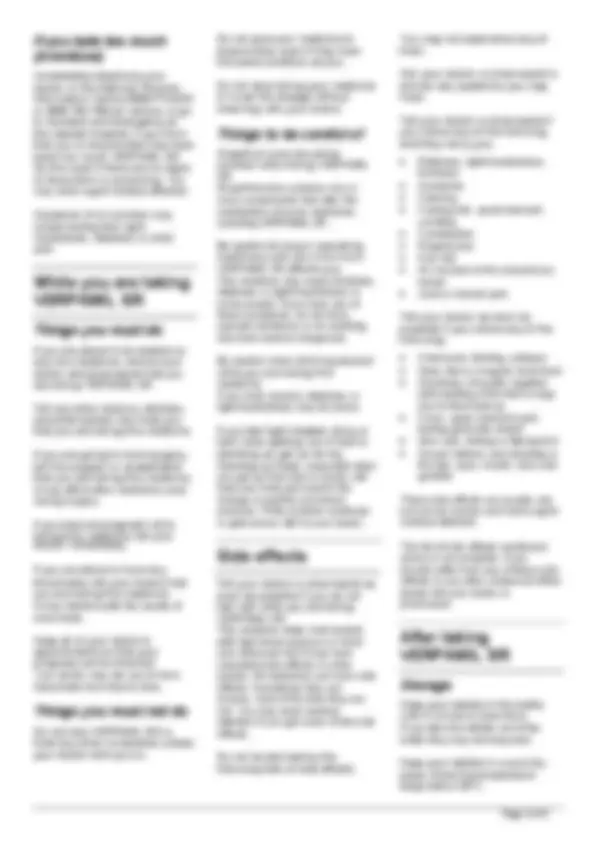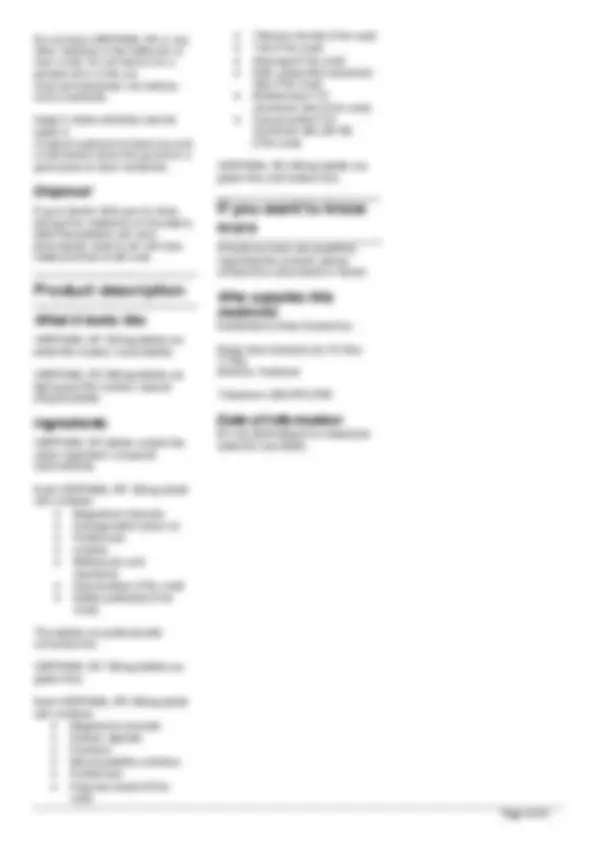




Study with the several resources on Docsity

Earn points by helping other students or get them with a premium plan


Prepare for your exams
Study with the several resources on Docsity

Earn points to download
Earn points by helping other students or get them with a premium plan
Community
Ask the community for help and clear up your study doubts
Discover the best universities in your country according to Docsity users
Free resources
Download our free guides on studying techniques, anxiety management strategies, and thesis advice from Docsity tutors
Information about verpamil sr, a medication used to treat high blood pressure, heart and chest pain, and prevent future heart attacks. Learn about its uses, dosage, side effects, interactions with other medicines, warnings, and precautions.
What you will learn
Typology: Exercises
1 / 4

This page cannot be seen from the preview
Don't miss anything!



This leaflet answers some common questions about VERPAMIL SR.
It does not contain all the available information. It does not take the place of talking to your doctor or pharmacist.
All medicines have risks and benefits. Your doctor has weighed the risks of you taking VERPAMIL SR against the benefits they expect
channel blockers. These medicines work by opening up blood vessels, causing blood pressure to fall and allowing more blood and oxygen to reach the heart.
Ask your doctor if you have any questions about why this medicine has been prescribed for you. Your doctor may have prescribed it for another reason.
This medicine is available only with a doctor’s prescription.
Do not take VERPAMIL SR if you are taking ivabradine, a medicine used to treat chest pain.
Do not take this medicine after the expiry date printed on the pack or if the packaging is torn or shows signs of tampering. If it has expired or is damaged, return it to your pharmacist for disposal.
If you are not sure whether you should start taking this medicine, talk to your doctor.
it will have for you.
If you have any concerns about taking this medicine, ask your
Tell your doctor if you have doctor or pharmacist. allergies to any other medicines,
Keep this leaflet with the medicine. You may need to read it again.
VERPAMIL SR is available in two strengths: VERPAMIL SR 120mg and VERPAMIL SR 240mg.
The letters SR in the name VERPAMIL SR stand for “sustained release”. This means the medicine is released into the blood over an extended period of time, usually allowing the medicine to be taken once a day.
VERPAMIL SR is used to treat
High blood pressure (hypertension) Heart and chest pain brought on, for example, by exercise or stress (known as angina pectoris) Long-term prevention of future heart attacks
Your VERPAMIL SR tablets contain verapamil. It belongs to a group of medicines known as calcium
Do not take VERPAMIL SR if you have an allergy to:
any medicine containing verapamil. any of the ingredients listed at the end of this leaflet.
Some of the symptoms of an allergic reaction may include: shortness of breath; wheezing or difficulty breathing; swelling of the face, lips, tongue or other parts of the body; rash, itching or hives on the skin
Do not give this medicine to a child. Safety and effectiveness in children have not been established.
Do not take VERPAMIL SR if you have certain other heart conditions such as heart failure, a very slow heart rate, some types of arrhythmias or a disease of the heart muscle.
Do not take VERPAMIL SR if you have low blood pressure, known as hypotension.
foods, preservatives or dyes.
Tell your doctor if you have or have had any of the following medical conditions:
any other heart problems liver problems kidney problems muscle conditions such as myasthenia gravis, Lambert- Eaton syndrome or advanced Duchenne’s muscular dystrophy
Tell your doctor if you are pregnant or plan to become pregnant. VERPAMIL SR may affect your developing baby if you take it during pregnancy. Your doctor can discuss with you the risks and benefits involved.
Tell your doctor if you are breast- feeding or plan to breast-feed. The active ingredient in VERPAMIL SR passes into breast milk. Your doctor can discuss with you the risks and benefits involved.
If you have not told your doctor about any of the above, tell him/her before you start taking VERPAMIL SR.
Tell your doctor or pharmacist if you are taking any other medicines, including any that you get without a prescription from your pharmacy, supermarket or health food shop. Some medicines and VERPAMIL SR may interfere with each other. These include:
Other medicines for high blood pressure, such as beta blockers, ACE inhibitors and vasodilators Alpha-blockers such as prazosin and terazosin, used to treat high blood pressure and enlarged prostates (BPH) Fluid tablets, also called diuretics Digoxin or Digitoxin, medicines used to treat heart failure Glibenclamide, a medicine used to treat diabetes
Medicines used to treat irregular heart beat (eg. disopyramide, flecainide, mexiletine, amiodarone and quinidine) Cimetidine, a medicine commonly used to treat reflux and ulcers Imipramine, a medicine used to treat depression
Lithium, a medicine used to treat mood swings and some types of depression Cyclosporin, everolimus, sirolimus and tacrolimus, medicines used to prevent organ transplant rejection or to treat certain problems with the immune system
Erythromycin, clarithromycin and telithromycin, antibiotic medicines
Carbamazepine, phenobarbitone and phenytoin, medicines commonly used to treat epilepsy
Rifampicin, an antibiotic used in conditions such as tuberculosis (TB)
Theophylline, a medicine used to treat asthma Midazolam, a medicine used to treat sleeping problems (insomnia) Buspirone, a medicine used to treat anxiety Cholesterol lowering medicines such as simvastatin, lovastatin and atorvastatin Aspirin, dabigatran or other medicines which affect the clotting of your blood
Antiviral medicines such as ritonavir, used to treat HIV infections Colchicine and sulfinpyrazone, medicines used to treat and prevent gout Doxorubicin, a medicine used to treat certain cancers Almotriptan, a medicine used to treat migraine St. John’s Wort, a product used to elevate mood
These medicines may be affected by VERPAMIL SR or may affect how well it works. You may need different amounts of your medicines, or you may need to take different medicines.
Your doctor and pharmacist have more information on medicines to be careful with or avoid while taking this medicine.
Follow all directions given to you by your doctor or pharmacist carefully. They may differ from the information contained in this leaflet.
If you do not understand the instructions on the bottle, ask your doctor or pharmacist for help.
For high blood pressure (hypertension), the usual dose in adults is one VERPAMIL SR 240mg tablet daily.
For elderly patients and patients new to verapamil therapy, an initial daily dose of VERPAMIL SR 120mg daily may be appropriate.
The maximum dose is one VERPAMIL SR 240mg tablet twice daily.
For prevention of future heart attacks, the usual dose in adults is between 240mg to 480mg VERPAMIL SR daily in 1 or 2 divided doses. The average daily dose is 360mg.
For prevention of chest pains
(angina), doses will generally be 120mg to 480mg VERPAMIL SR daily in 1 or 2 divided doses. The average daily dose is 360mg.
For all conditions, it is advised any single dose should not exceed 240mg.
VERPAMIL SR is not intended for use in children.
Do not halve VERPAMIL SR tablets.
When switching from immediate release verapamil to VERPAMIL SR, the total daily dose in milligrams may remain the same.
Swallow the tablets whole with a full glass of water.
Take your medicine at about the same time each day. Taking it at the same time each day will have the best effect. It will also help you remember when to take it.
VERPAMIL SR should be taken regularly, preferably with or shortly after meals with some liquid.
VERPAMIL SR is usually taken as long-term treatment. Keep taking VERPAMIL SR for as long as your doctor recommends.
If it is almost time for your next dose, skip the dose you missed and take your next dose when you are meant to.
Otherwise, take it as soon as you remember, and then go back to taking your medicine as you would normally.
Do not take a double dose to make up for the dose that you missed. This may increase the chance of you getting an unwanted side effect.
If you are not sure what to do, ask your doctor or pharmacist.
If you have trouble remembering to take your medicine, ask your pharmacist for some hints.
Do not store VERPAMIL SR or any other medicine in the bathroom or near a sink. Do not leave it on a window sill or in the car. Heat and dampness can destroy some medicines.
Keep it where children cannot reach it. A locked cupboard at least one-and- a half metres above the ground is a good place to store medicines.
If your doctor tells you to stop taking this medicine or the expiry date has passed, ask your pharmacist what to do with any medicine that is left over.
VERPAMIL SR 120mg tablets are white film coated, round tablets.
VERPAMIL SR 240mg tablets are light green film coated, capsule shaped tablets.
VERPAMIL SR tablets contain the active ingredient, verapamil hydrochloride.
Each VERPAMIL SR 120mg tablet also contains:
Magnesium stearate Hydrogenated castor oil Purified talc Lactose Methacrylic acid copolymer Hypromellose (Film coat) Diethyl phthalate (Film Coat).
The tablets are polished with carnauba wax.
VERPAMIL SR 120mg tablets are gluten free.
Each VERPAMIL SR 240mg tablet also contains: Magnesium stearate Sodium alginate Povidone Microcrystalline cellulose Purified talc Polyvinyl alcohol (Film coat)
Titanium dioxide (Film coat) Talc (Film coat) Macrogol (Film coat) D&C yellow #10 aluminium lake (Film coat) Brilliant blue FCF aluminium lake (Film coat) Sunset yellow FCF aluminium lake [E110] (Film coat).
VERPAMIL SR 240mg tablets are gluten free and lactose free.
Should you have any questions regarding this product, please contact your pharmacist or doctor.
Distributed in New Zealand by:
Mylan New Zealand Ltd, PO Box 11183, Ellerslie, Auckland.
Telephone: (09) 579 2792
02 July 2020 (Based on datasheet dated 02 July 2020)